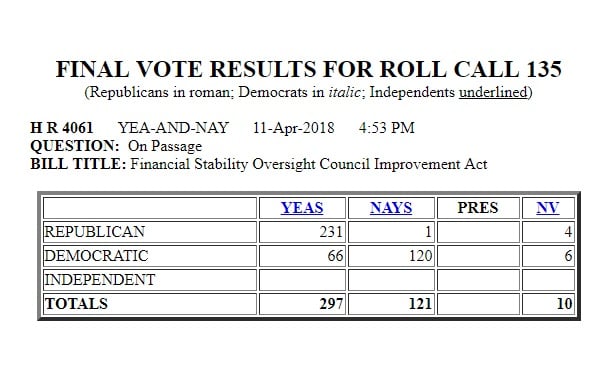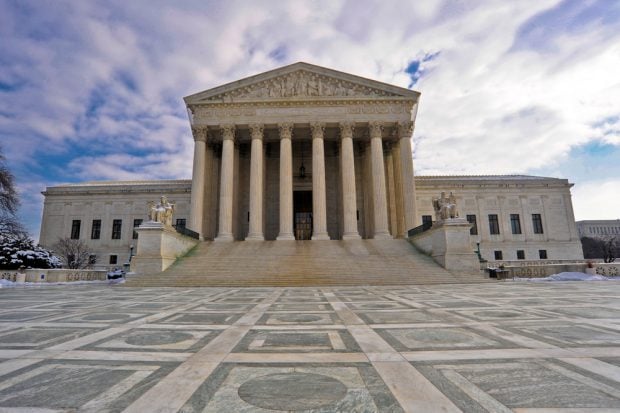
Congress could be closer to changing a financial servicescompany risk management program that it developed in the wake ofthe Great Recession.
|Members of the U.S. House on Wednesday voted 297-121 to passH.R. 4061, the Financial Stability Oversight Council ImprovementAct bill.
|All but one of the 232 Republicans who voted supported thebill.
|The bill also received an unusually high level of support fromHouse Democrats: 66 of the 186 Democrats who participated voted forthe bill.
|Getting the support of one-third of the Democrats in the Senatewould give supporters a good shot at getting the bill through theSenate under “regular order” rules. Republicans hold 51 seats inthe Senate. Under regular order rules In the Senate, an ordinarybill needs 60 votes to reach the Senate floor.
|The bill was introduced by Rep. Dennis Ross, R-Fla.
|A Child of the Great Recession
|If passed as written and implemented as drafters expect, H.R.4061 would require FSOC to use a more open process when decidingwhether life insurers and other non-bank organizations are“systemically important financial institutions,” or SIFIs.
|Congress put the SIFI program in the Dodd-Frank Act of 2010, in an effort to givefederal financial services regulators a tool for stepping inwhen it looks as if the meltdown of a company other than a bankmight shake the U.S. financial system.
|Executives at American International Group Inc., brought afestering financial crisis out in the open in September 2008, whenthey warned federal regulators that they faced an enormous,escalating need for cash to serve as collateral for the company'scredit defaults swaps operation.
|The credit default swaps unit provided a kind of financialinsurance against the risk that mortgage-backed securities would gobad. AIG ran into trouble when mortgage-backed securities that oncelooked like good risks started to go bad.
|Many people involved with life insurance have argued thatAIG's credit default swaps business had nothing to do withordinary life insurance operations, that ordinary life insuranceoperations pose little or no threat to the stability of the U.S.financial system, and that the SIFI designation process has createdcostly, nerve-wracking headaches for life insurers.
|MetLife Inc., for example, went to court to free itself fromSIFI status and won. In April 2016, a federal judge ruled thatthe process FSOC used to designate MetLife as a SIFI was arbitraryand capricious.
|Supporters of the current SIFI designation system say thatfederal regulators need a vehicle they can use to address bigproblems at companies other than banks and securities brokers, andthat the program has to be flexible and opaque enough to keep thecompanies' managers from evading necessary federal oversight.
|Complete your profile to continue reading and get FREE access to CUTimes.com, part of your ALM digital membership.
Your access to unlimited CUTimes.com content isn’t changing.
Once you are an ALM digital member, you’ll receive:
- Critical CUTimes.com information including comprehensive product and service provider listings via the Marketplace Directory, CU Careers, resources from industry leaders, webcasts, and breaking news, analysis and more with our informative Newsletters.
- Exclusive discounts on ALM and CU Times events.
- Access to other award-winning ALM websites including Law.com and GlobeSt.com.
Already have an account? Sign In
© 2024 ALM Global, LLC, All Rights Reserved. Request academic re-use from www.copyright.com. All other uses, submit a request to [email protected]. For more information visit Asset & Logo Licensing.









